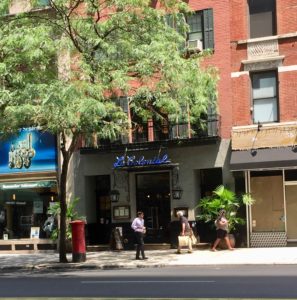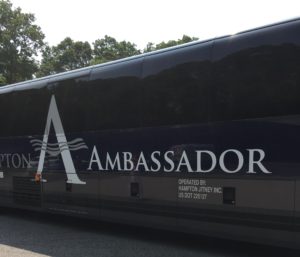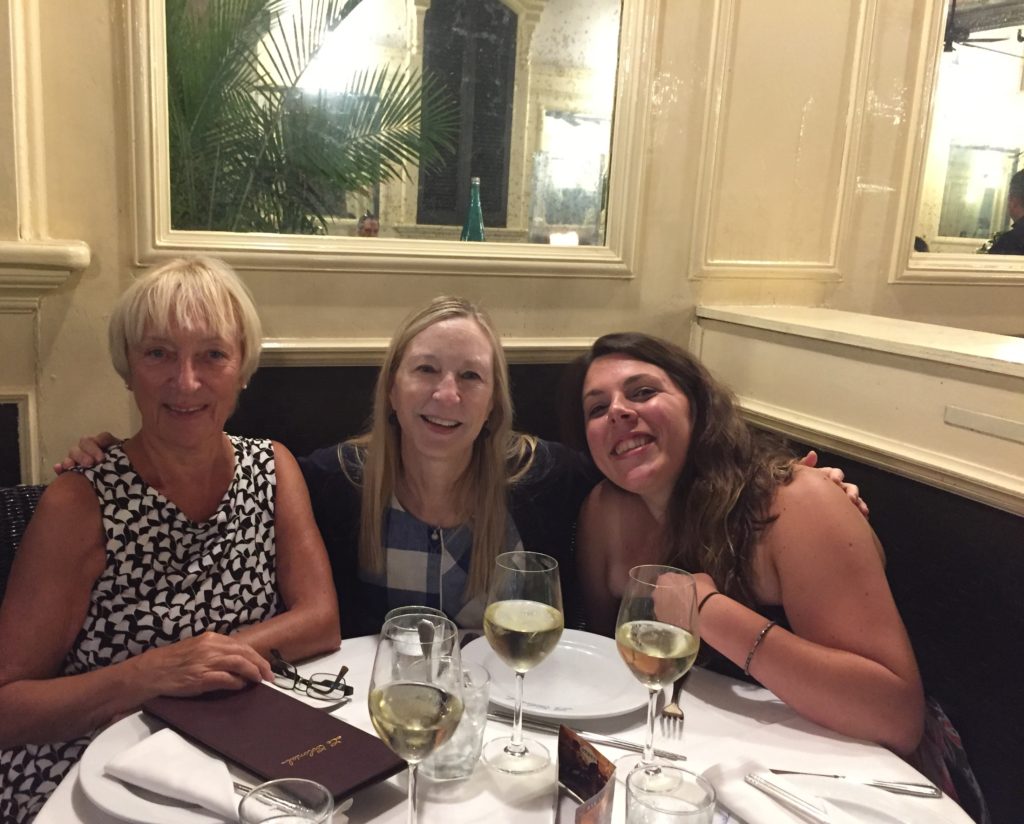
Writers sometimes need to get together with other writers to swap stories of the hardships of a writing life, and occasionally to celebrate a piece of good news about the latest WIP (work-in-progress.) This week, I got together with two compadres who I met several years ago at the Algonkian writers’ workshop in St. Augustine, Florida.
Since then, I have mentioned members of this 8-strong group (we call ourselves the Gonks) in posts on this blog. Several of them have contributed guest posts on how to get published (Greg), how to query agents (Mandi) and how to write a screenplay that will get optioned (Doug.)

Noreene (pictured above) is the driving force behind our mini-reunions in the New York area. This year, she arranged for lunch at Le Colonial, a restaurant with French-Vietnamese cuisine on 57th Street in Manhattan. It’s the sort of place where, as its name suggests, you feel you should be sipping gin and tonics, but where Noreene and Mandi and I settled for Chablis and Cabernets (a goodly number of them, I might add.)
Mini-Reunion

Organizing a mini-reunion is no small feat since Chris (pictured with Noreene) can only be lured from her California home by a Manolo Blahnik sale (If you don’t get the pun, it’s because you probably don’t know that Manolo Blahnik is a “shoemaker”!)
Mandi can only drive into the city for lunch when she’s finished teaching school somewhere in New Jersey, Noreene herself can only attend when she is between travels to her various retreats in the Caymans, France and the Berkshires.
And me? Well, it’s all about putting myself in a suitable frame of mind to cover the eighty miles between Manhattan and the Hamptons on East End of Long Island.
Bus To Manhattan
 There are a number of ways to cover those 80 miles including the usual rail and car. But the two most popular seem to be private jet (and shame on those flying over the homes and tennis courts of folks who come out to the Hamptons for peace and quiet!) There is also the Hampton Jitney with its slightly more expensive sister, the Hampton Ambassador — a luxury coach service between the North and South Forks of Long Island and Manhattan.
There are a number of ways to cover those 80 miles including the usual rail and car. But the two most popular seem to be private jet (and shame on those flying over the homes and tennis courts of folks who come out to the Hamptons for peace and quiet!) There is also the Hampton Jitney with its slightly more expensive sister, the Hampton Ambassador — a luxury coach service between the North and South Forks of Long Island and Manhattan.
I took the Hampton Ambassador (the schedule was more convenient) It’s not the worst way in the world to travel. You leave the driving to someone else, and as with flying, the two hour trip into the city allows for a good chunk of reading time. Since the Hampton Jitney/Ambassador fare includes copies of the local newspapers, it’s a good time to catch up on local news.
Authors Who Almost Quit

I also caught up with news about the current crop of authors whose novels are being touted as the best thrillers of 2019. Adrian McKinty is one of these authors. His thriller The Chain is being described as the “hot read” of the summer. So, it was interesting for me to discover that McKinty, the author of a series of novels about a Belfast detective, decided to quit writing fiction a few years ago.
He wrote about that decision in his blog: Although his novels had garnered awards, he was not making money from them, and was unable to support his young family without supplementing his income as an Uber driver and bartender. His blog came to the attention of author Don Winslow who persuaded an agent to call McKinty. The agent encouraged Adrian to pitch an American story to him rather than writing about a detective from Northern Ireland. McKinty started writing The Chain that week.

Louise Candlish is another author who considered quitting after having eleven novels published. After some of her novels flopped, their sales figures influenced the print orders and budgets for her next books. “You’re almost doomed to continue the pattern,” she told the U.K. newspaper, The Guardian. Candlish was fortunate, however, to find a new publisher with her 12th novel, Our House, which became a bestseller.
Small surprise that the subject of quitting novel-writing came up over our reunion lunch at Le Colonial — even as we toasted the successes of two members of our group: Doug (pictured above) whose screenplay is being produced this summer, and who has been commissioned to write another screenplay; and Greg whose novel about an inner city firefighter, Beneath The Flames, was published earlier this year by Three Towers Press, an imprint of HenschelHAUS, a Milwaukee-based publisher.
Perseverance
 In his guest posts for this blog, Greg (pictured) documented his determined journey to publication. He wrote about contacting 90 agents, of whom all but two declined to represent him before HenschelHAUS offered to publish him without agent representation. But then, Greg’s photo is in the dictionary next to the word “perseverance.”
In his guest posts for this blog, Greg (pictured) documented his determined journey to publication. He wrote about contacting 90 agents, of whom all but two declined to represent him before HenschelHAUS offered to publish him without agent representation. But then, Greg’s photo is in the dictionary next to the word “perseverance.”
Over lunch with Noreene and Mandi, I had to confess that I would have quit if 88 agents turned me down. Not that I’d ever have the fortitude to contact 90 agents in the first place. And –fingers crossed — hopefully, I’ll never have to even think about that many agents again. Currently, I am close to signing with an agent I contacted when my manuscript was completed. We have talked about revisions I need to make; I have been sent a contract; I have asked for minor additions to the contract; I am waiting to hear back.
Disheartening Search

Nevertheless, over another drink, we agreed that looking for an agent it is one of the most disheartening stages of the process of getting published. Mandi whose first novel (Her Beautiful Monster) was published by a small, independent publisher in 2012 (and is still available as an e-book on Amazon) has guest blogged here about the process. Mandi raised the question of quitting — but admitted she knew where she’d been too hasty submitting her latest manuscript. At 30, she is, anyway, too young to quit.
We had another drink, and Noreene told us about her decision to hire an editor specifically to help with drafting query letters and with targeting agents in her genre for her thriller, Breaking Through. It is an expense not every writer can afford. Noreene and I agreed that life would be so much simpler if we quit and just lay around on the beach reading other authors.
Perfect Pitch
There’s thousands of them out there. Authors, that is. And, well, yes, agents, too. The art is to find the right one for your work because if you’re looking to be traditionally published, especially by one of the Big Five publishers, you can’t do it without agent representation.
There are hundreds of articles online devoted to the subject of finding an agent. There is a recently published book, Making The Perfect Pitch, a compilation of agent interviews and articles collated by Katharine Sanders in which agents describe how they work and how they choose the authors they represent.
Thrillerfest 2019 — a writers conference that is attended by agents and editors looking for new material — just wrapped in New York City. Here, pitches are made by hundreds of writers who have about two minutes to sell the novel they’ve been working on for, maybe, three or four years. Most writers there have also attended pitch workshops to learn how to distill a 400-page novel into a two-minute description.
More Writers Than Readers?
 So, the three of us had another drink and agreed that the worst part of querying agents was waiting for responses. And, of course, that’s really not entirely the fault of the agents. It is only a small part of their job to read queries and look for new clients (whilst representing existing clients.) More significantly, most, to hear them tell, are totally overwhelmed by the sheer numbers of writers sending in queries.
So, the three of us had another drink and agreed that the worst part of querying agents was waiting for responses. And, of course, that’s really not entirely the fault of the agents. It is only a small part of their job to read queries and look for new clients (whilst representing existing clients.) More significantly, most, to hear them tell, are totally overwhelmed by the sheer numbers of writers sending in queries.
It used to be, a couple of decades ago (when my first two novels were published) that a writer would have to buy a book listing literary agents, then write a snail mail letter pitching his/her work, and when asked for the full manuscript, have a copy (often running to 300+ pages) printed out, packaged and mailed by snail mail to the agent. These days, it takes about ninety seconds to compile your sample chapters (even your entire manuscript) as a word document and hit the send button to email it to an agent’s website or query manager. It’s no longer a joke to say that here are probably more writers trying to get published than there are readers to read all the books that are being published.
At the end of our reunion –which was actually more cheerful — we laughed a lot — than perhaps it sounds here — Noreene walked me to the bus stop at 59th and Lex where I boarded the eastbound Jitney. No problem with the 80 miles going home. They serve wine on the Hampton Ambassador in the afternoons. I didn’t need any, however. I opened my Kindle, but was napping within minutes.
If you enjoyed this blog, please click on the Like button to let me know.
Great news on being close to signing with an agent Joanna 🙂 Good luck, and hop eit works out the way you want!!
Thanks so much, Eldon. But you know what they say: close only counts with horseshoes and hand grenades!!!! I am optimistic. Always. But am never surprised if things take a left turn!!!!! Will keep all posted.
Look forward to hearing of your success. Success, I’ve no doubt, you will attain 🙂
Trust me, you will be among the first to hear. It’s going to be a while yet, though. Thank you for your good wishes, Eldon